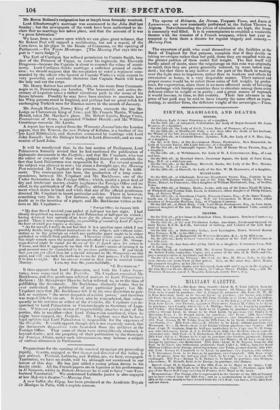" Foreign Office, 1st January 1836.
"My dear Sir—I received your packet at half-past ten last night. I had already despatched my messenger to Lord Palmerston at half-past six o'clock; having detained him upwards Of an hour fior the chance of receiving your packet. There is now, consequently, no possibilitu ojecousalling Lord P. &Are the hour at which gun require a decision. " As for myself, I really do not feel that it is a question upon which I can possibly decide, being without instructions on the subject, anti without infor- mation as to the principle on which any particular paper ought to be either published or witheld from publication. 1 therefore return your packet, with this single remark upon the second document —that it is a paper Mr. Strang- ways desired ?night toe copied ,hr the use of Sir i Lamb upon his return to Vienna, and that it appears to me that ir F. Lamb's MMUS of turning it to good account must he diminished Iwy its previous publication. If you think that you can yet Miord time for a special reference to Mr. Strituuwavs on this point, and will . Lmil back the enclosure to me for that purpose, i will transmit it to him to-nii,ht. But his answer cannot in that case be received before Monday. 1 am, my dear Sir, yours faithfully,
"J. HACKNOVRE."
It thus appears that Lord Palmerston, and loth his Under Secre- taries were concerned in the Portidio. Mr. Urquhart consulted Mr. Backimuse, and that gentleman referred matters to Lord Pahnerston's decision ; Mr. Strangways likewise being referred to, as to the time of publishing the documents. Mr. Bathhouse distinctly denies that he ever authorized the publication of any particular paper ; but Mr. Urquhart says that Mr. Backhouse left it to his own discretion to pub- lish or suppress " the secret despatch of a third power," and therefore .was responsible for his act. It must also be remembered, that subse- quently to his services as editor of' the Purtfidie. Mr. Urquhart was de- spatched by Lord Palmerston to Constantinople as Secretary of Lega- tion. ‘1,-hatever precise degree of responsibility attaches to any of the parties, this is manifest—that Lord Palmerston sanctioned, when he might have stopped, the Portfdio. Mr. Urquhart says that he has a legal opinion that Lord Palmerston is respoostole for the expenses of the .NrOlio. It would appear, though ibis is not expressly stated, that the documents themselves were fmnished front the archives at the Foreign Office. That some of them were surreptitiously obtained, is beyond doubt ; and the propriety of their publication by the Secretary for Forehco A tiairs, under such eireunistanLes, may become a subject of curious discussion in Parliament.


























 Previous page
Previous page